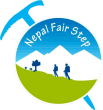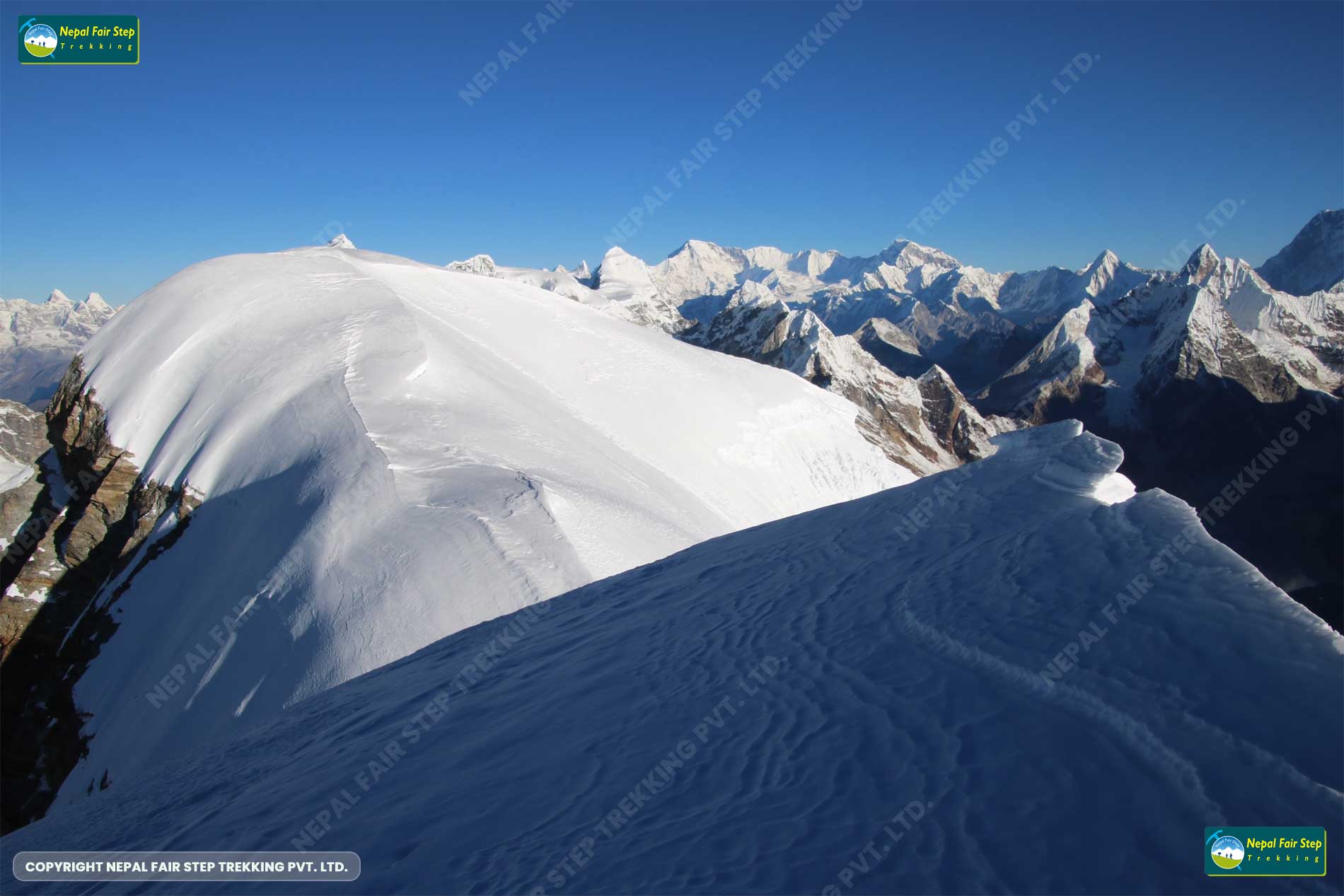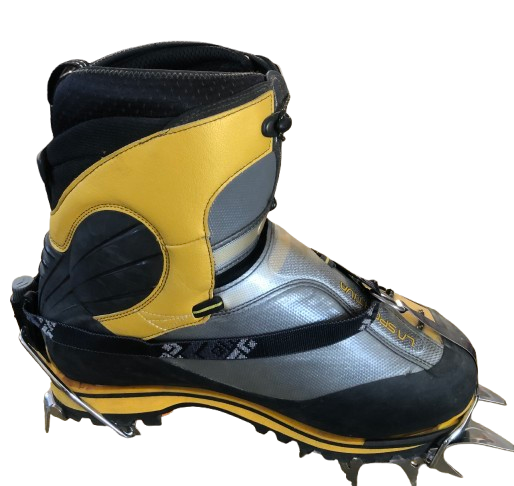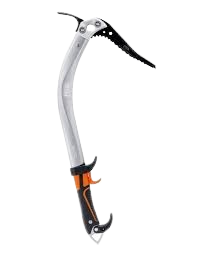Trekking Grade
Trekking Category
[/simple
_tooltip]
Mera Peak is one of the highest and most adventurous trekking peaks in Nepal. Rising south of Mt. Everest, the ascent of Mera is generally technically straightforward, requiring little more than crampons and an ice axe. However, it is 100% safe to climb and any mountaineers and people with no climbing experience can do it.
After flying from Kathmandu to Lukla, our trek will begin by heading southeast from Lukla. We walk along a high, rocky ridge through dense forests and cross several streams before reaching the high pass that takes us into the remote and largely uninhabited Honku Valley. Trekking in this wild land of Himalayan pine forests is indeed a lifetime experience. At Tangnag, we take a rest and explore the huge moraine and the beautiful glacial lake north of the village. The next day, we gently proceed to Khare and set up camp. Our ascent follows the glacier that leads to Mera La (5,415 m) and on to high camp, where we prepare for our early morning summit. From high camp, we can take in a sweeping view of Mt. Kanchenjunga, Mt. Makalu to the east, Mt. Everest and Mt. Lhotse to the north, and Mt. Amadablam and Mt. Cho-Oyu to the west. This view is undoubtedly one of the most mesmerizing all in Nepal. As we make our way back down the valley to Lukla for our flight to Kathmandu, our Mera Peak climbing has completed. The trekking trail will pass through several ethnic villages of the Everest region, where we can come across the local people and get to know more about them and their local culture and traditions.
The best times to attempt Mera Peak are spring (March-May) and autumn season (September-November). The weather conditions are best at these times. For more information, contact us at info@fairsteptrekking.com
On your arrival at Tribhuvan International Airport in Kathmandu, a representative from Nepal Fair Step Trekking will meet and assist you in transfer in a private vehicle to the hotel. A pre-departure briefing about Mera Peak trekking and climbing along with inspection of equipment will be held in the afternoon at hotel lobby. In the evening we will host dinner to you in the Nepalese restaurant. Overnight stay in hotel
After breakfast a local tour guide will meet you at the hotel and arrange Kathmandu sightseeing tour. Today you will visit the major places of tourist interest such as Pashupatinath , the most popular Hindu temple, Patan Durbar Square, renowned for art and architecture and Swayambhunath, a famous Monkey temple. In the late afternoon you will return to the hotel and make preparation for tomorrow trip to Mera peak climbing. Rest of the day you can stay at leisure. We recommend you to leave a bag or any unnecessary stuff during the trek/ climb, you may store them at the hotel. Overnight stay in hotel
After breakfast at the hotel, begin your journey to Dhap, a scenic destination offering the first panoramic views of Everest along with the breathtaking Himalayan mountain range. This drive, lasting approximately eight hours, blends cultural and natural experiences.
The route begins on a relatively good highway, constructed with Japanese assistance, and follows the Sun Kosi River—a prominent river in eastern Nepal known for rafting adventures. As you drive, you’ll witness a fascinating mix of Hindu and Buddhist cultural influences in the towns and villages.
The road climbs steadily after Okhaldhunga for the final three-hour stretch to Dhap, with road conditions remaining favourable.
Off-road drive from Patale Dhap to the Mahakulung rural municipality. After crossing the Dudh Koshi River, going straight from Sotang to Bung. On the way, you will reach a small ethnic village of Chetri, Tamang and Rai. It is a full-day cultural excursion with their people, lifestyle, language, customs, etc. And walk towards Khiaule Gompa/monastery which is Sherpa village where the oldest Estd Buddhist monastery is located. About 1738 AD. Spend the night in a Lodge near the monastery.
After lunch, we will begin the trek to Khiraule, a beautiful Sherpa village. Instad of sitting on the Jeep, you will enjoy walking over the hills, through rhododendron forest, crossing the flowing streams and ultimately reaching Khiraule village. In the middle of the village, you can visit Khiraule Monastery, one of the oldest monasteries in the Everest region. Besides, you can visit Chyang Chub Chorten ( Stupa), one of the eight types of Tibetan Stupa that symbolizes the significant events in the life of Gautam Buddha. If you wish, you can meditate nearby Khiraule Monastery in the open space surrounded by pines and Mani wall. Overnight stay at Teahous
On the fifth day after breakfast we continue our trek slowly passing through some uphill and downhill terrain to beautiful rhododendron forest. If you are lucky, you will see Red Panda in the bamboo forest. On the way we observe diverse botanical plants until we reach Cholem Kharka. While trekking for some time we will notice the gradual changes of landscape from greenery to rocky and wild terrain. Overnight stay at teahouse
Today the trail goes uphill towards PanchPokhari (five lakes). While trekking, you can inhale sweet smell of different Himalayan Rhododendrons and wild herbs. If weather allows, you can enjoy the spectacular views of Mt. Numbur (6,958m.), Mt. Kusum Kanguru (6,367m), Mt. Kyashar or Peak 39( 6,769m.) ,Mt. Karyalum (6,500m.)and Dhudhkunda Himal. After walking for 5 to 6 hours you will reach Panch Pokhari( five lakes).Panch Pokhari is a cluster of five lakes located at 4010m. in beautiful natural environs surrounded by the Himalayan mountains. Hindu and Buddhist pilgrims regard Panch Pokhari as Holy place and every year thousands of people visit this Holy place on the occasion of two important religious festivals like Janaipurnima and Nag panchami held in the month of August. This festival is very popular among the locals as well as shamans. Overnight stay at teahouse
Today’ s trek begins with a slow ascent and then descend very steeply to Mujang Khola. While ascending, you will see beautiful views of PanchPokhari and a great Yak pasture. After descent you will cross a small stream ( khola) called Mujang and walk through the Himalayan Alpine forest to Khote, located at the bank of a river with plenty of teahouses. Kothe is also the intersection of Lukla and Mera peak climbing trek. Overnight stay at teahouse
After breakfast we begin our trek on the rocky path along the Hinku Khola. As soon as we leave Kothe, we will see three summits of Mera in front of our eyes. After a couple of hours of the trek we will reach Thangnag for lunch. Thangnag is popular for yak grazing in summer. Here you will be surprised to see the beautiful setting of the natural surroundings and the spectacular views of Kyashar Peak, Kusum Kanguru and East Peak. Overnight stay at teahouse
In the morning you enjoy a short hike to the top of a ridge south of Thangnag and surrounding views. You will ascend 5000m and enjoy a great view of Kyashar Peak,Kusum Kangaru,Makalu, Ama Dablam, Mera Cental peak, if good weather allows. At Thangnag it is worth spending some time to acclimatize well. Overnight stay at teahouse
After breakfast we will make a short ascent of approximately three to four hours. Today’s hike will be the most rewarding throughout the journey .Leaving Tangnag we ascend steep uphill where some prayer flags are seen fluttering in the air. From the hilltop we will overlook the tumbling glacier from the Kyeshar peak. After climbing from Dig Khare the trail gets easier for some time and then once again make an ultimate steep climb to reach Khare where we will have lunch and spend a free time in the afternoon. From Khare we will have beautiful views of Mera Peak, Kyeshar Peak and other popular Himalayan mountains. Overnight stay at teahouse
Today we will spend an acclimatization day in Khare. Possibly we climb the glacier that lies towards Mera La using our equipment- ice ax, crampons, rope and jumar. In Khare our climbing guide will check a complete equipment that our guests have carried and if any equipment is found lacking, we can rent at Khare. Before ascent we need to make sure that all our climbing equipment is perfect. Overnight at teahouse
Today we will climb the High Camp at 5,800m on the Mera glacier. After we climb the glacier,the slope decreases and then we gently move ahead to Mera La which is quite cold and extremely windy. From Mera La, the trail is straight and we will move ahead through the glacier and reach the High Camp at 5,800m. Here we will set up a camp. From the camp we can enjoy the magnificent views of five spectacular Eight thousander mountains, ranging from Kanchenjunga ( 8,586 ) in the east through Makalu (8,463m), Lhotse ( 8516m ), Nuptse (7,855m) and Everest ( 8,848m) to Cho Oyu ( 8,201m) in the west. During the day time our guide will finally check the equipment to make sure every member in the group is well equipped for tomorrow’s climbing and summit attempt to Mera Peak. To be noted that the High Camp is exceedingly cold. Overnight stay at Camp
Wake up around 3 o’clock in the early morning and after taking a light breakfast your climbing begins. This is the right time to start climbing as the weather is stable and less windy. You must wear crampons, carry ice ax and jumar .Today is your most exciting and challenging day as you are attempting to reach the top of Mera peak. It will be a slow ascent without any technical struggle most of the day. You will feel out of breath and wheezy because climbing in the thin air at this higher altitude is quite challenging. As you are gradually heading to the summit, you need to take a rest on a pass. Your accompanying climbing sherpa/guide will help you in securing a safety rope at the last section of the climb before summit. Please note that the last section of the climb to the summit is the most difficult and on this section you will need the Jumar.
When you step your foot on the top, you can celebrate your victory with your team members. It will be the most joyous moment for you. From the summit you can enjoy the 3600 panoramic views of Mt. Kanchenjunga, Mt. Makalu, Mt. Everest, Mt. Cho Oyu and many other peaks and take pictures of them.
From the summit we will follow the same steep section of the path for descent with the support of fixed rope. Our descent is faster than ascent. After the descent we will reach the High Camp, where we enjoy a hot soup and drinks. From the High Camp we again descend to a lower altitude and finally reach our Base Camp in Khare in the late afternoon. Overnight stay at teahouse
After breakfast at Khare we will begin our trek following the same path through the Hinku Valley we used before. It will be an easy descent. On the way we will enjoy the spectacular view of the Himalayan mountain range and reach Thangnag for lunch. After lunch we will continue our trek and finally reach Kothe. It is a beautiful village very popular for its locally homemade wines ( Rakshi) and other Nepalese delicacies. Overnight stay at Kothe
Note: Those who prefer to fly back to Lukla/Kathmandu, Nepal Fair Step Trekking cam arrange heli flight.
Today we will take a safe route passing through the mixed forest instead of Chatra La Pass. As Chatra La Pass is risky due to snowy and slippery trail and high chances of landslide, we will choose a safe and easy route for safety reason. Following the safe route, we will make several ascents and descents over the hill and this route is less crowd. Very few trekkers are seen on this route. Overnight stay at Teahouse
After breakfast, we begin our trek, passing through the lush forest abundant in various rhododendron species and tall fir and pines. The day will have chances to see barking deer, mountain Thar, including the endangered species Red panda. Chirping different birds makes you amused. Sherpa village will welcome your arrival at Sibuche. Overnight stay at Teahouse
Today will be the last day of hiking in this trek. After your breakfast, you will hike about four hours to Kharikhola to catch main trail of Everest base camp trek. After having lunch at Karikhola and quick farewell to some trekking crew and drive to Sallery, headquarter of solukhumbu.
Optional activities: Mountain flight, Valley sightseeing, cooking class etc.
After breakfast in the hotel, you can enjoy a free day in Kathmandu for any of the above activities. You will enjoy a farewell dinner in a local family/ restaurant. Overnight stay in hotel
To be able to submit a cost estimate, we need to know the number of persons in your group, the required hotel category, the favored mode of transportation (by flight, by local or private transport) and any alternations to your itinerary.
Airport pickup and drop (domestic and international)
Local transportation; (Domestic flight, road transport according program)
Hotels: (4/2) star standard hotel including breakfast (according to program in Kathmandu& other places)
Welcome and farewell dinner
Sightseeing in Kathmandu (Patan Durbar square, Swyambunath, Pashupatinath)
Sighseeing Bhaktapur and Boudhanath
Camping/ Lodge Trek’s cost according to program
Full board during the trek (Breakfast, Lunch and Dinner)
Government-licensed guide (English speaking or other foreign language if requested)
Required numbers of porters (1 porter for 2 guests; 12 kg per guest in Tea house trek)
Sightseeing entry fees/national park /conservation/restricted area permit fees (monasteries, temples, Stupa entrance fees but not donation.)
TIMS (Trekker’s information Management System) permits or peak climbing permit fees (according to your program)
Group First Aid Kits (We recommend bringing your personal first aid kit as well.)
Trekking bag for each guest.
Staff insurance
Trekking bag for each guest
Nepal Fair Step Trekking printed T-Shirt
International airfare from and to your country
Nepal Visa fee (bring accurate USD 50 cash for 30 days visa and need to fill online form)
Excess baggage charges
Personal gears
Personal expenses e.g. phone calls, laundry, bar bills & extra porters
Travel & Health Insurance – Emergency Helicopter Rescue Insurance (Most recommended)
Any meals (lunch &dinner) in Kathmandu – $ 10 to 15 for per meal in tourist restaurant (except welcome and farewell dinner)
Any kinds of drinks (alcohol &non-alcoholic beverage) neither during the trek nor in Kathmandu
Tips for staff (not mandatory but expected)
Hot shower, recharging of batteries (available during the
The cost which is not mentioned above.





